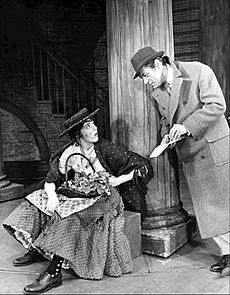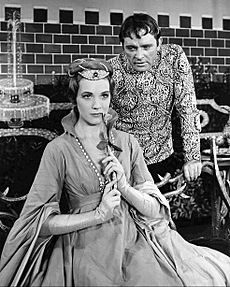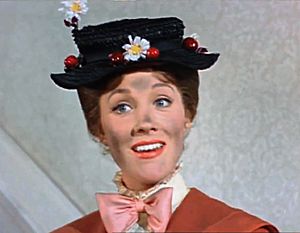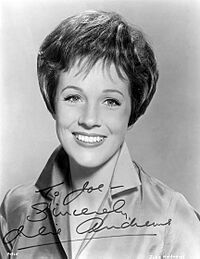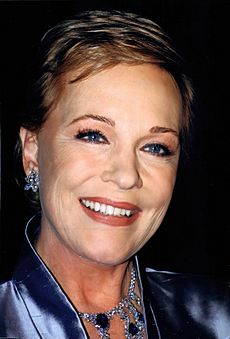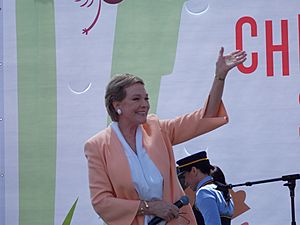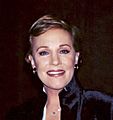Julie Andrews facts for kids
Quick facts for kids
Julie Andrews
|
|
|---|---|
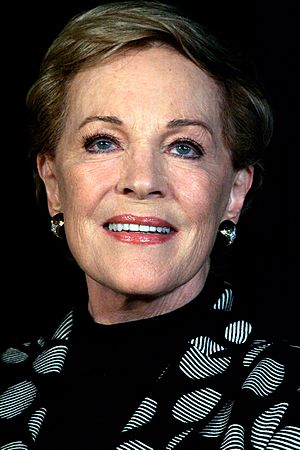
Andrews in 2013
|
|
| Born |
Julia Elizabeth Wells
1 October 1935 Walton-on-Thames, Surrey, England
|
| Occupation |
|
| Years active | 1945–present |
|
Works
|
Full list |
| Spouse(s) |
|
| Children | 3, including Emma Walton Hamilton |
| Awards | Full list |
Dame Julie Andrews (born Julia Elizabeth Wells on October 1, 1935) is a famous English actress, singer, and author. She has won many awards over her long career, which has lasted more than eight decades. These awards include an Academy Award, a British Academy Film Award, two Emmy Awards, three Grammy Awards, and seven Golden Globe Awards. She was also nominated for three Tony Awards.
Julie Andrews was one of the most popular movie stars in the 1960s. She has received special honors like the Kennedy Center Honors in 2001 and the Screen Actors Guild Life Achievement Award in 2007. In 2022, she received the AFI Life Achievement Award. In 2000, Queen Elizabeth II made her a Dame (DBE).
As a child, Julie Andrews was an actress and singer. She performed in London's West End in 1948. Her Broadway debut was in The Boy Friend in 1954. She became very well known for her roles in Broadway musicals. She played Eliza Doolittle in My Fair Lady (1956) and Queen Guinevere in Camelot (1960). She also starred in the TV musical Cinderella (1957).
Her first movie role was playing Mary Poppins in Walt Disney's Mary Poppins (1964). For this role, she won the Academy Award for Best Actress. The next year, she starred in The Sound of Music (1965). She played Maria von Trapp and won the Golden Globe Award for Best Actress – Motion Picture Comedy or Musical.
Julie Andrews has starred in many films. She worked with directors like her husband Blake Edwards, George Roy Hill, and Alfred Hitchcock. Some of her films include The Americanization of Emily (1964), Hawaii (1966), Torn Curtain (1966), Thoroughly Modern Millie (1967), and Victor/Victoria (1982). She later returned to movies in The Princess Diaries (2001) and The Princess Diaries 2: Royal Engagement (2004). She also voiced characters in the Shrek franchise (2001–2010) and the Despicable Me franchise (2010–present).
Andrews is also known for working with Carol Burnett on TV specials. These include shows in 1962, 1971, and 1989. She had her own variety show, The Julie Andrews Hour (1973), and won an Emmy Award for it. More recently, she helped create and hosted Julie's Greenroom (2008, 2017). She also voiced Lady Whistledown in the Netflix series Bridgerton (2020–present). Julie Andrews has written many children's books with her daughter. She also wrote two autobiographies about her life.
Contents
Early Life and Training
Julia Elizabeth Wells was born on October 1, 1935, in Walton-on-Thames, Surrey, England. Her mother, Barbara Ward Wells, was a musician. Her father, Edward Charles "Ted" Wells, was a teacher. Her parents separated and later divorced during World War II. Both of them remarried.
Julie Andrews lived with her mother and stepfather, Ted Andrews. Her stepfather was also a performer. The family was very poor during the war. As her mother and stepfather's stage careers improved, they moved to better homes.
Andrews's stepfather helped her get singing lessons. She first attended the Cone-Ripman School. Then she studied with a famous voice teacher, Madame Lilian Stiles-Allen. Andrews said Stiles-Allen had a huge impact on her. Stiles-Allen believed Julie had a rare gift for music. Andrews described her own voice as "very pure, white, thin," with a four-octave range. After Cone-Ripman, Andrews continued her regular schooling at Woodbrook School.
Amazing Career Highlights
Early Performances
From 1945, Julie Andrews performed with her parents on stage. She would stand on a beer crate to sing into the microphone. She sang solos or duets with her stepfather. She later said it "must have been ghastly," but audiences seemed to like it.
Her big break came when her stepfather introduced her to Val Parnell. He managed many famous performance places in London. At age 12, Andrews made her professional solo debut. This was at the London Hippodrome on October 22, 1947. She sang a difficult song from an opera called "Mignon." She performed at the Hippodrome for a year.
On November 1, 1948, at age 13, Andrews made history. She became the youngest solo performer to appear in a Royal Variety Performance. This was for King George VI and Queen Elizabeth at the London Palladium. She performed with famous stars like Danny Kaye.
Andrews also worked in radio and television. She was on the BBC comedy show Up the Pole. She was also a cast member in Educating Archie from 1950 to 1952. She appeared on TV for the first time in 1949. She also performed in London's West End theatre in musicals like Aladdin and Humpty Dumpty. In 1952, she voiced Princess Zeila in an animated movie called The Singing Princess. This was her first film and voice-over role.
Broadway Debut and Big Success
On September 30, 1954, the day before her 19th birthday, Andrews made her Broadway debut. She played Polly Browne in the musical The Boy Friend. She was nervous about moving to New York. But her father encouraged her to take the part.
The Boy Friend was a big hit. Critics praised Andrews, calling her the best part of the show. In 1955, she appeared with Bing Crosby in a TV film called High Tor. This was her first screen project.
After The Boy Friend, Andrews auditioned for My Fair Lady. She was offered the role of Eliza Doolittle. She felt she could truly understand and play Eliza. The director, Moss Hart, worked closely with her. Andrews said it was the best acting lesson she ever had. My Fair Lady opened on Broadway on March 15, 1956. It was a huge success with audiences and critics.
Richard Rodgers was so impressed with Andrews. He wrote the TV musical Cinderella especially for her. Cinderella was broadcast live on CBS on March 31, 1957. An estimated 107 million people watched it. Andrews was nominated for an Emmy Award for her role. In 1957, she released her first solo album, The Lass with the Delicate Air.
Between 1956 and 1962, Andrews appeared on many TV shows. These included The Ed Sullivan Show and The Jack Benny Program. In June 1962, she starred in Julie and Carol at Carnegie Hall with Carol Burnett. In 1960, she was cast as Queen Guinevere in Camelot. She starred alongside Richard Burton as King Arthur. Camelot opened to good reviews.
When the movie version of My Fair Lady was being cast in 1962, Andrews hoped to play Eliza again. However, the studio decided she wasn't famous enough for movies. The role went to Audrey Hepburn. Andrews later said she understood the decision.
Mary Poppins and Movie Stardom
In 1963, Andrews began working on Disney's musical film Mary Poppins. Walt Disney had seen her in Camelot and offered her the role. Andrews first said no because she was pregnant. But Disney insisted, saying they would wait for her. After her daughter was born, she got a call from P. L. Travers, the author of the Mary Poppins books. Travers told her, "Well, you're much too pretty of course. But you've got the nose for it."
Mary Poppins became the biggest movie hit in Disney history. Critics praised Andrews's performance. The film was nominated for 13 Academy Awards and won five. Andrews won the Academy Award for Best Actress. She also received the Golden Globe Award for Best Actress – Motion Picture Comedy or Musical. Andrews and her co-stars won a Grammy Award for the film's album.
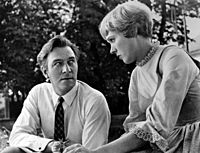
Andrews then starred in The Americanization of Emily (1964) with James Garner. She took this role to avoid being typecast as a nanny. Critics loved her performance. She was nominated for a BAFTA Award. Andrews later said this was her favorite film.
Next, she starred in The Sound of Music (1965). This was the highest-grossing film of its year. Andrews initially thought the musical was "rather saccharine" (too sweet). Filming was slow due to weather in Austria. Andrews used her voice to show Maria's character. The film received mixed reviews, but critics praised Andrews. She won her second Golden Globe Award for Best Actress – Motion Picture Comedy or Musical. She was also nominated for another Academy Award and BAFTA Award.
After The Sound of Music, Andrews appeared on The Andy Williams Show. She also had her own Emmy-winning special, The Julie Andrews Show, in 1965. In 1966, she starred in Hawaii, which was the highest-grossing film of that year. She also starred with Paul Newman in Torn Curtain (1966), directed by Alfred Hitchcock. Andrews learned a lot about filmmaking from Hitchcock.
In 1967, Andrews played the main character in Thoroughly Modern Millie. She found working on the film a "pleasant distraction." The movie was a box office success. Critics called Andrews "absolutely darling" and "deliciously spirited." She earned another Golden Globe nomination.
Later Career and New Roles
Andrews appeared in Star! (1968) and Darling Lili (1970). Darling Lili was directed by her second husband, Blake Edwards. She recorded songs for the film with Henry Mancini. While the film was not a commercial success, critics praised Andrews's performance. She was nominated for another Golden Globe.
Andrews continued to work in television. In 1969, she had a special with Harry Belafonte. In 1971, she and Carol Burnett starred in another CBS special. From 1972 to 1973, Andrews had her own TV variety series, The Julie Andrews Hour. The show won seven Emmy Awards but was canceled after one season. She guest-starred on The Muppet Show in 1977. She made two other films in the 1970s, The Tamarind Seed (1974) and 10 (1979). Both were successful.
In 1980, she starred in Little Miss Marker. In Blake Edwards's Victor/Victoria (1982), she played two roles. Her performance earned her a Golden Globe Award for Best Actress – Motion Picture Comedy or Musical. She also received her third Oscar nomination. In 1983, she was named the Hasty Pudding Woman of the Year. Her next films were That's Life! and Duet for One (both 1986). These earned her more Golden Globe nominations. In 1987, she starred in an ABC Christmas special that won five Emmy Awards. Two years later, she reunited with Carol Burnett for a TV special.
In 1991, Andrews made her dramatic TV debut in Our Sons. She was named a Disney Legend that year. In 1992, she starred in a TV sitcom called Julie, but it was short-lived. A rose was named after her at the Chelsea Flower Show in London in 1992. In 1993, she starred in a stage show called Putting It Together. In 1995, she starred in the stage musical version of Victor/Victoria. This was her first Broadway show in 35 years. She declined a Tony Award nomination for the show.
Children's Entertainment and Recent Roles
In 1997, Julie Andrews had throat surgery that affected her singing voice. Despite this, she stayed busy with many projects. In 1998, she appeared in a stage production of Dr. Dolittle in London. She voiced Polynesia the parrot, recording hundreds of sentences for the mechanical bird. In 1999, she reunited with James Garner for the TV film One Special Night.
In 2000, Andrews was made a Dame Commander of the Order of the British Empire by Queen Elizabeth II. In 2001, she received Kennedy Center Honors. That same year, she reunited with her Sound of Music co-star Christopher Plummer in a TV performance of On Golden Pond.
In 2001, Andrews appeared in The Princess Diaries. This was her first Disney film since Mary Poppins. She played Queen Clarisse Marie Renaldi. She returned for the sequel, The Princess Diaries 2: Royal Engagement (2004). In this film, she sang on screen for the first time since her throat surgery. The song, "Your Crowning Glory", was written to suit her recovering voice.
Andrews continued working with Disney. She appeared as the nanny in two TV films based on the Eloise books. These were Eloise at the Plaza (2003) and Eloise at Christmastime (2003). She was nominated for an Emmy Award for these roles. In 2003, she directed a revival of The Boy Friend, the musical where she made her Broadway debut.
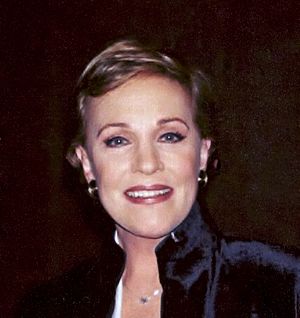
From 2005 to 2006, Andrews was the Official Ambassador for Disneyland's 50th-anniversary celebration. She traveled to promote the event and narrated a fireworks show. In 2004, Andrews voiced Queen Lillian in the animated movie Shrek 2. She returned for Shrek the Third (2007) and Shrek Forever After (2010). In 2007, she narrated Enchanted, a Disney musical comedy.
In January 2007, Andrews received the Lifetime Achievement Award at the Screen Actors Guild awards. In 2008, she published Home: A Memoir of My Early Years, the first part of her autobiography. It covers her early life and ends with her getting the role of Mary Poppins. In 2004, she also narrated The Cat That Looked at a King for a Disney video. From July to August 2008, Andrews hosted Julie Andrews' The Gift of Music. She sang Rodgers and Hammerstein songs. These were her first public singing performances in 12 years. In 2009, The Times newspaper named her one of the top 10 British Actresses of all time.
In January 2010, Andrews presented the Great Performances concert from Vienna. She also had a supporting role in the film Tooth Fairy. On May 8, 2010, Andrews performed in London after a 21-year break. She performed at The O2 Arena. She did a form of "speak singing" and also sang some solos and duets.
On May 18, 2010, her 23rd book, The Very Fairy Princess, was published. She wrote it with her daughter Emma. In June 2010, it became a number 1 best-seller for children's books. On May 21, 2010, her film Shrek Forever After was released. She returned as the Queen. On July 9, 2010, Despicable Me was released. Andrews voiced Marlena Gru, the main character's mother. On October 28, 2010, Andrews appeared on Oprah to celebrate The Sound of Music's 45th anniversary.
In February 2011, Andrews received a Grammy Lifetime Achievement Award. She also won a Grammy with her daughter Emma for Best Spoken Word Album for Children. In her memoir Home Work (2019), Andrews mentioned being offered a role in The Wolf of Wall Street (2013). She declined due to a recent surgery. In 2013, at age 77, Andrews went on her first tour of Australia and New Zealand. She gave a series of speaking engagements instead of singing. She took the show to England in 2014.
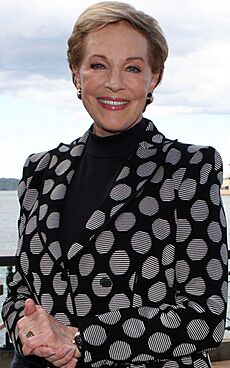
Andrews has directed a musical stage show called The Great American Mousical. It is based on a children's book she wrote with her daughter. She first directed it in 2012. In 2024, she directed a second, sold-out production.
In 2015, Andrews made a surprise appearance at the Oscars. She greeted Lady Gaga, who sang songs from The Sound of Music. In 2016, Andrews created the preschool TV series Julie's Greenroom with her daughter. The show features puppets from The Jim Henson Company. It premiered on Netflix in 2017. In 2017, Andrews also returned as Marlena Gru in Despicable Me 3. In 2018, Andrews voiced Karathen in Aquaman. That same year, she chose not to make a cameo in Mary Poppins Returns. She did not want to take attention away from the new star, Emily Blunt.
Since December 2020, Andrews has voiced Lady Whistledown, the narrator in the Netflix series Bridgerton. In 2022, Andrews narrated the film The King's Daughter. On June 9, 2022, the American Film Institute honored Andrews with a Lifetime Achievement Award. She reflected on her career and received tributes from many artists. The same year, she returned as Gru's mother in Minions: The Rise of Gru.
In April 2023, Andrews honored her friend Carol Burnett in a TV special. She also appeared in a CBS special for Dick Van Dyke's 98th birthday. She shared stories about working with him in Mary Poppins.
Personal Life
Julie Andrews married set designer Tony Walton on May 10, 1959. They first met in 1948. Their daughter, Emma Walton Hamilton, was born in 1962. They divorced in 1968.
In November 1969, Andrews married director Blake Edwards. She became a stepmother to his two children. In the 1970s, Edwards and Andrews adopted two daughters from Vietnam. They were married for 41 years. Blake Edwards passed away on December 15, 2010, at age 88. Andrews was by his side. Julie Andrews is a grandmother to nine children and a great-grandmother to three.
Andrews lives in Sag Harbor, New York. Her daughter Emma helped start the Bay Street Theater there.
Vocal Style
Julie Andrews was once called "Britain's youngest prima donna" (a leading female singer). Her voice was trained in classical music. It was described as light, bright, and operatic. It was praised for its "pure and clear" sound. When she was young, a doctor found she had an "almost adult larynx" (voice box). Her voice teacher encouraged her to sing opera. However, Andrews felt her voice was not right for opera. She thought it lacked the "guts and weight" needed. She preferred musical theater instead.
Over time, her voice naturally became deeper. She lost some of her very high notes. Her middle voice became warmer and richer. She always preferred singing "bright and sunny" music. She avoided sad songs or those in a minor key. She felt these might make her lose her voice "in a mess of emotion." This was another reason she avoided opera.
Voice Changes
Andrews had to leave the Victor/Victoria stage show in 1997. She developed hoarseness in her voice. She had surgery on her throat. She later said the hoarseness was due to a muscle strain on her vocal cords. After the surgery, her voice was permanently damaged. It affected her singing and made her speaking voice raspy.
After 2000, a doctor named Steven M. Zeitels operated on her four times. He was able to improve her speaking voice. However, he could not restore her singing voice.
Awards and Honors
Julie Andrews has received many awards throughout her career. These include an Academy Award, a BAFTA Award, six Golden Globe Awards, three Grammy Awards, and two Emmy Awards. She was nominated for three Tony Awards, but she never won one. In June 2022, Andrews received the AFI Life Achievement Award. In 2002, she was ranked No. 59 in the BBC's poll of the "100 Greatest Britons."
Images for kids
See also
 In Spanish: Julie Andrews para niños
In Spanish: Julie Andrews para niños


